Shop windows in Ramallah were shuttered yesterday within hours of Minister Ziad Abu Ein’s death from a heart attack following an assault by Israeli soldiers in the West Bank village of Turmusaya. A state funeral was held today with a ceremony at the Muqataa, the seat of the Palestinian Authority and a procession to a nearby cemetery. Thousands poured through the streets and a team of masked men brandished AK-47s for an hour’s worth of an impromptu gun salute. Indeed it was the largest funeral in Ramallah in years, signaling Abu Ein’s passing has become a national cause. Because he died while olive tree planting in the spirit of human rights, the image of an executed peacemaker also colors his passing.
Details of Abu Ein’s death remain unclear because the official autopsy report has not yet been release. The hold up is due to Israeli officials who are refusing to sign the completed joint report. Palestinian Civil Affairs Hussein al-Sheikh said in an interview with Palestine Today that the report does indicate that Israeli actions were responsible for Abu Ein’s death.
In response to the death Palestinian Authority President Mahmoud Abbas is reportedly reconsidering his government’s relationship with Israel. Abbas is expected make an official declaration Friday evening and has said “all of the options are on the table.” At the moment Abbas and his leadership council have not made any concrete decisions, but Palestinian officials are weighing specific actions: changing or canceling the security coordination agreement in place with Israel since the Oslo Accords, submitting a United Nations Security Council Resolution, or acceding to the Rome Statute and joining the International Criminal Court–each of which has been proposed in various incarnations over the past few years. While Chief Palestinian Negotiator Saeb Erakat and other leaders have suggested that the Palestinian government is prepared to relinquish all aspects of security coordination with Israel, PLO Central Committee member Dr. Nabil Shaath, the Palestinian architect of the current security arrangement, tells Mondoweiss “re-defining” security roles with Israel, rather than terminating them altogether, is a likely option.
“Re-defining” security coordination with Israel
“Re-defining” security coordination with Israel would constitute a Palestinian refusal to assist in Israeli operations in the major Palestinian cities, Area A of the West Bank.
Mandated by the Oslo Accords, the Israeli army exercises full security control over Area C of the West Bank, where a majority of settlements are located, and joint security control with the Palestinian Authority in Area B, functionally suburbs and villages of Palestinian population centers. But Area A of the West Bank—home to Ramallah, Bethlehem, Hebron, Jenin and Jericho—are registered under full Palestinian security control per the peace agreements. Within this framework under the doctrine of “security coordination,” the Palestinian Authority shares intelligence on, and suppresses Palestinian demonstrations against, matters pertaining to points of Israeli infrastructure in the West Bank. When Palestinian marches to checkpoints or settlements originate from Area A, as they do on a weekly basis, “security coordination” in this context translates to Palestinian police deploying often repressive means to halt the protest.
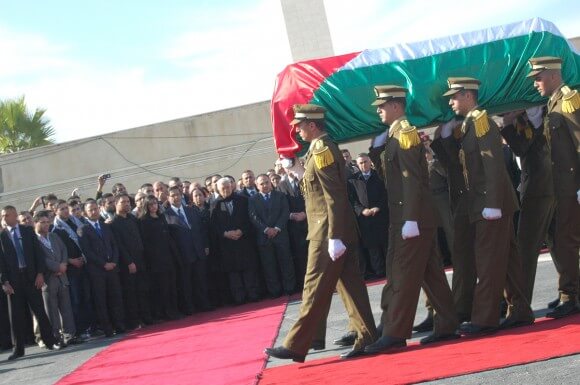
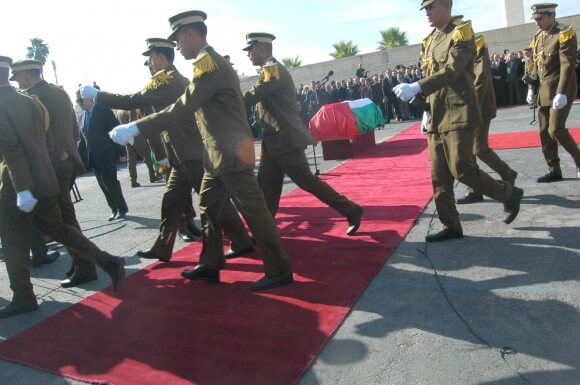
The tenor of what could occur in Israeli-Palestinian relations if security coordination is “re-defined” by the Palestinian Authority was witnessed during the summer war in Gaza when in late July thousands marched from Ramallah to the Qalandia checkpoint, the main crossing from the West Bank to Jerusalem. Days before a Fatah local council leafleted Ramallah calling for Palestinians to rise up against the Israeli authorities. When Palestinians went to march on Israeli checkpoints over the proceeding days, Palestinian police stood aside.
It was in this period that the “48 Thousand March” took place late last July. That demonstration, which takes its name from the scores who seemingly spontaneously arrived at the famed checkpoint, almost caused a breakdown of Israeli control in the West Bank. Hundreds were wounded, 60 from live-fire including medical professionals. But more importantly, the Palestinian protesters almost breached the Israeli barrier into Jerusalem. Under the security agreement with Israel it is the Palestinian Authority’s job to quell demonstrations like this, before they reach Israel’s over 60 West Bank checkpoints or hundreds of settlements. This PA role is regarded as a key ingredient to preventing a Palestinian uprising in the occupied territory. That is, the Palestinian Authority has played a tremendous role in keeping a third Intifada at bay through security coordination with Israel.
“Israel uses us as guards,” said Dr. Shaath via telephone from Brussels where he is lobbying European governments to recognize Palestinian statehood. “Israel violates every element of the agreement specifically that they don’t come into Area A,” he continued. “That would be the minimum requirement to maintain that agreement.”
While Dr. Shaath was not in Ramallah at the time of Abu Ein’s death, he revealed that the PA has considered “re-defining” security coordination with Israel seriously in recent months, a process where he is crucial. Dr. Shaath is credited as an early Palestinian designer of security coordination with Israel, negotiating the 1994 Gaza-Jericho Agreement, a document where Israel agreed to recognize Palestinian zones of security autonomy, meaning no Israeli forces allowed. He explained over the past year the Palestinian Authority sought out a team of international law experts in the drafting of the new parameters for re-defined security cooperation. “The discussion started with the burning of Mohammed Abu Khdier in Jerusalem and the burning of 32 mosques in the West Bank,” he said.
“The president himself said he wants to continue the security coordination, but we are being attacked,” said the PLO Negotiations Affairs Department Spokesman Ashraf Khatib who confirmed while the PA has made no decision yet on the matter of security coordination, the president would offer a response in the next 24 hours. “How to keep this type of relationship, but also to re-define it in a way where Israel will not take advantage of it so that Israel will not undermine the PLO and the Palestinian people,” said Khatib, will be a reevaluation point for the president.
“There has always been critics of the Palestinian Authority over security coordination and Abu Mazen [Abbas] stood up to the criticism, but later, with all of the settler attacks, Israel created the urgency,” to changing joint security, added Dr. Shaath.
While Abu Ein died yesterday in Area C of the West Bank where he was assisting in a tree-planting project to mark both International Human Rights Day and a petition filed in Israel’s high court to return village lands confiscated by an illegal outpost. His death is regarded as an example of the Palestinian inability to seek redress for crimes committed by Israelis in the occupied territory and Abu Ein’s passing and the fallout is demonstrating the power differentials between the two parties. That lack of sovereignty is most pronounced by the presence of Israeli forces inside of Area A where they have no legal mandate to operate. In the past year Israeli soldiers have entered Area A on near daily occurrences, according to data from the PLO’s Daily Monitoring Reports. Moreover, Israel recently ordered the deportation of four members of the Palestinian Legislative Council from Jerusalem to Ramallah. Over the summer another council member Khalida Jarrar was also given a deportation order from Ramallah to Jericho, an act without any legal basis according to current arrangements.
Because Abbas has taken measured steps in lieu of radical changes to his relationship with Israel in the past, most notably with delaying a full acceptance to Rome Statute, a task such as re-defining security coordination appears to be a more probable course of action than canceling it outright as other Palestinian leaders have called for.

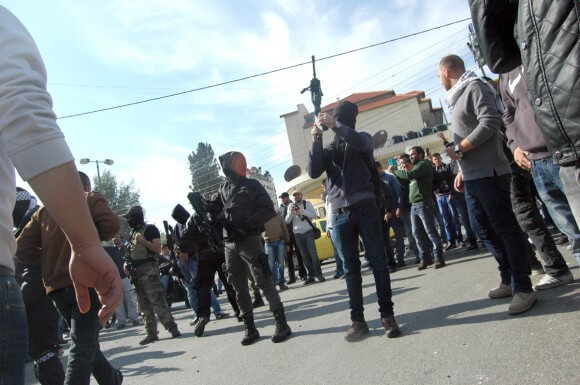
Israel refuses to sign autopsy report, stymies medical investigation
President Abbas has called Abu Ein’s death a “killing” and a “crime” committed by the Israeli army. Choosing sterner words, Chief Palestinian Negotiator Saeb Erakat referred it as an “assassination.” Amin Maqbul Fatah Council Secretary said it was an “ugly murder” that “was carried out right before our eyes,” referring to Sky News video footage of the assault by Israeli soldiers on Abu Ein just before he collapsed.
While high-ranking officials throughout the Palestinian government have weighed in on Abu Ein’s passing, Israeli leaders have remained comparatively quiet. Yesterday they released a limp four-sentence statement. Official condolences were offered by Defense Minister Moshe Ya’alon, “We express sorrow over his death,” he said calling for “security stability” and continued “coordination with the PA” in his remarks.
An official in the PLO-Negotiation Affairs Department added that no European government, nor the U.S. government, has sent a note of condolence to the Palestinian government. However the European Commission has called for an independent investigation.
Abu Ein died yesterday morning before 11:00am from “a blockage of the coronary artery,” where “the bleeding could have been caused by stress,” according to the preliminary findings of the autopsy the Israeli Ministry of Health said this morning. “The poor condition of the deceased’s heart caused him to be more sensitive to stress,” the report continued. Yet a Palestinian official who reviewed the unpublished medical report said “the autopsy was completed last night and the Jordanian physicians confirmed that he was assassinated by Israeli occupation forces.” Per an Israeli request, Jordanian and Israeli officials sat in on the examination.”
“At first Israel wanted a joint investigation into the death, but we refused. They also wanted the autopsy to be conducted in the Abu Kabir institute, which we also refused and insisted that it is conducted in the Abu Dis institute, under PA sponsorship,” said the chief of Palestinian Civil Affairs Hussein al-Sheikh in an interview with Palestine Today this morning.
“The Israelis asked to have one of their doctors present and we agreed so that there is no doubt about the findings and there can be a complete condemnation,” said al-Sheikh, adding, ”The cause of death was because the soldiers beat him, fired intensive teargas and prevented Abu Ein from reaching the hospital on time. There is no other narrative.”
However, Israeli officials have refused to sign the completed autopsy report, stymieing the dissemination of the results. As al-Sheikh’s interview suggests, the examination would confirm Israeli criminal culpability. And so Israel maintains Abu Ein expired because of a preexisting condition, but Palestinians and their medical report ruled foul play.
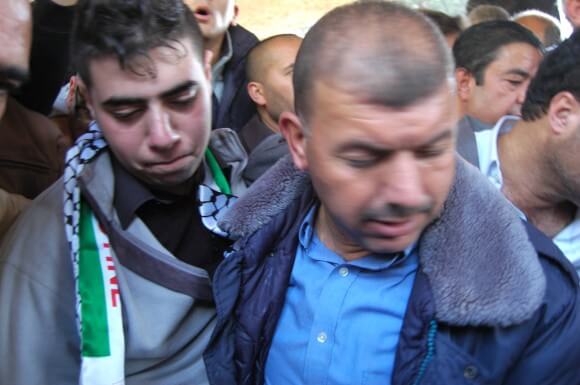
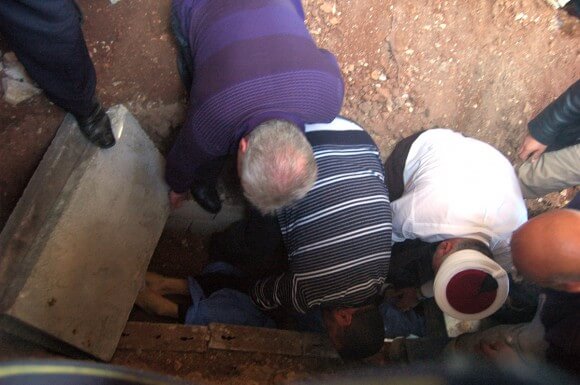
Thousands mourn Abu Ein in Ramallah
In his youth Abu Ein spent three years in an American prison before being extradited to Israel on charges relating to the slaying of two Israelis in the norther town of Tiberias. At age 20 he became the first Palestinian deported from the U.S. to face punishment in Israel. “Abu Ein claims that the two Palestinians who signed confessions incriminating him while held in Israeli prisons in connection with the same incident have since retracted their statements,” said a Christian Science Monitor report published at the time in 1981, continuing, “He also claims to have 14 witnesses who can verify that he was miles away at the time of the bombing.”
After being prosecuted in Israel Abu Ein spent another 12 years incarcerated before being released in a prisoner exchange. At the time of his death he was a father of four and worked in the Fatah faction as the head of the commission against settlements where he regularly conducted field such as the one on the day of his death.
“The separation is difficult but he didn’t die just any death,” said Mahmoud Abu Ein, 61, brother of the deceased, continuing to describe the amount of mourners, “you could see this as the Palestinian wedding that was made for Ziad. We are all proud and happy, we are all the sons of Palestine.”
“Our people have to continue with the popular resistance. Our fight, between the Israelis and the Palestinians is a long fight but we have to keep fighting for our lives. There won’t be peace until we gain our rights. Until we reach our rightful borders,” he added.



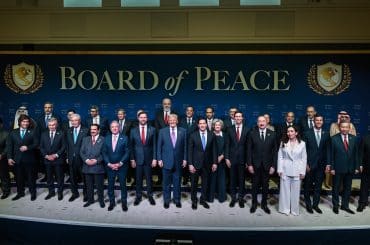
Thank you so very much, Allison. Your photos are amazing, too. It appears that he received the respectful funeral befitting a peacemaker. My deepest condolences to his family, his fellow ministers, his friends, and the Palestinian people.
The Israelis never admit responsibility, much less the truth. I hope that President Abbas and his team do the right thing. I wish the world would as well.
“An official in the PLO-Negotiation Affairs Department added that no European government, nor the U.S. government, has sent a note of condolence to the Palestinian government. However the European Commission has called for an independent investigation.”
Utterly shameful.
“Because he died while olive tree planting in the spirit of human rights, the image of an executed peacemaker also colors his passing.”
RIP, Zaid Abu Ein.
Worth a view:
http://electronicintifada.net/blogs/nidal-el-khairy/decolonize-palestine
The leaders of the Jewish State in the Levant (JSIL) know that the PLA will huff and puff and do nothing. It’s kind of embarrassing at this point. How many times can they actually cry wolf?
As usual a report by Deger oozing with blatant bias.
This assertion is so political biased – the truth isn’t important, foremost is the Palestinian narrative. Why haven’t other protesters died before in similar circumstances? Palestinian protesters regularly put the IDF to the test with their routine confrontational demonstrations that deliberately aim to generate violence to implicate Israel.
Jordanian officials under the dictates of their leaders no doubt have said “he was assassinated by Israeli occupation forces” with nothing whatsoever to prove this. Their aim is simply to incite.
How ridiculous is this statement – Israel would sign an autopsy report that is based on lies and pro-Palestinian propagandist claims!
Here we go again, the rabbit being pulled out of the hat right on cue: Abbas has postponned the scheduled Friday evening meeting that was intended to formally announce the end of the sercurity arrangements with the bad guys until Sunday. This will undoubtedly have the double effect of letting Palestinians passions cool off and to give Israel the opportunity to present Abbas with some face-saving gimmick or other to force the Palestinians back into their cage. Maybe Israel could release a few prisoners or some other jest to buy the peace. The postponement coupled with Shaath’s long-distance announcements is a dead giveaway. Kerry must have whispered sweet nothings in Abbas’ ears, or maybe Neranyahu threatened to turn off all of the Palestinians’ lights and phone lines.